Glasgow scientists have reprogrammed human cells using leftover skin tissue from surgery to replicate wounds from diabetic foot ulcers.
The work is part of a three-year project which researchers hope could lead to the development of new treatments for diabetic foot ulcers which do not need to be tested on animals.
Glasgow Caledonian University accessed skin tissue samples from people with type 2 diabetes who donated their tissue to the university’s Skin Research Tissue Bank. The researchers then created batches of human stem cells from the samples which can be reprogrammed into different types of cells, including brain cells and nerve cells.
One example of this reprogramming was the creation of a 3D model mimicking a diabetic foot ulcer. This has enabled comparisons to be made with cells from people without diabetes and also provided the ability to try out new treatments.
A spokesman for Animal Free Research UK, which has funded the research, said: “Using human tissue has many advantages over using tissue from animals – it gives a much better idea of how drugs that are used in the laboratory could be developed into medicines in the future.
“In addition, the use of human tissue and cells replaces the need for animal experimentatio, and reduces the use of animal products in research.”
Professor Ann Graham, lead author of the study, told The Herald: “Over 135 diabetes-related amputations are carried out each week in the UK. We know that this is a growing problem and we hope that our work can inform research and aid others who require access to human material for medical research.”
Subsequent research will comprise skin cells from people with diabetes reprogrammed to examine links between type 2 diabetes and Alzheimer’s disease, as well as investigations into conditions which affect the skin, such as diabetic wound healing and psoriasis.
What's new on the forum? ⭐️
Get our free newsletters
Stay up to date with the latest news, research and breakthroughs.








